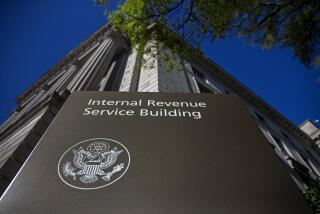Tax Dodging--a National Game of Catch Me If You Can
- Share via
BUENOS AIRES, Argentina — When government inspectors showed up recently at a fashionable mountain resort to stalk tax evaders, shopkeepers pelted them with eggs.
Another inspector--or “bloodhound,” as they are nicknamed--was chased from a smart country house in Buenos Aires province by its knife-wielding owner, angry at the intrusion during a backyard barbecue.
Once again, Argentina’s government has declared war on tax dodgers, this time arming inspectors with new laws to fine business owners and to close their shops and restaurants.
But in a country where evasion has long been considered a national sport--half of the country is believed to cheat on taxes--inspectors need more than courage and laws.
“Evading your taxes is an art. You always have to be a step ahead,” said Jose, the owner of a popular, cut-price restaurant in downtown Buenos Aires who spoke on condition he not be fully identified.
“I have no problem outwitting inspectors. It’s part of my living,” he added with a smirk.
Carlos Silvani, the latest head of the tax bureau, says what is needed is a change in mentality.
“We’re trying to change this culture where dodging taxes is equated with being cool and smart,” Silvani said in a recent television interview.
In the past, the tax bureau has used all manner of persuasion trying to entice Argentines to pay up. Billboards urge consumers to demand sales receipts so store owners cannot hide revenue.
Now, the bureau has set up a lottery whose winners are picked from people who send in sales receipts, the information from which is fed into computers to aid tax investigations. In December, a woman won 1 million pesos--$1 million--when her restaurant bill was picked out.
The government also has set up a telephone hotline for people to report cases of tax evasion.
Under a new law passed in January, retail businesses that do not issue sales receipts can be fined as much as 30,000 pesos ($30,000) and risk being closed for as long as a month.
Customers who fail to demand a receipt for goods worth more than 10 pesos can be fined from 20 to 2,500 pesos.
In the first 30 days of the new crackdown, the tax bureau said its inspectors visited 10,000 businesses and discovered 2,006 cases of evasion. As a result, 137 businesses were closed and fined. Silvani said several consumers were fined for not demanding receipts.
“Now, you don’t know who you’re dealing with, who’s watching you or who’s standing outside on the street,” said Salvador Cabos, who runs a small store off Buenos Aires’ main shopping street, Florida.
Bar owner Ricardo Llanes said the government is trying to create a nation of snitches by encouraging people to turn in others. “What we need in times of recession is solidarity. Not this,” he said.
Traditionally, the simplest way to evade taxes was to buy and sell in cash, keep few records, stash profits under the mattress or overseas, and count on government incompetence in pursuing cheaters.
Now, businesses are being required to install special cash-register software that will store all records of payments.
The “black boxes”--which the government says must be installed in cash tills nationwide by April 1998--are impossible to tamper with, officials say. Inspectors can demand them at any time to update their records.
Jose scoffed at the idea. He nodded at the staircase that leads to his restaurant’s basement as he licked his finger to count a thick wad of peso bills.
“I have two identical cash tills--the same make and the same serial number,” he said. “I keep one in the restaurant to make everything look legal. The other’s downstairs.”
During the day, he records purchases on the register upstairs in case tax inspectors drop by. At night, he throws the receipts and the register’s ribbon away and makes new records downstairs.
“Inspectors are welcome any time, as long as they stay upstairs with the rest,” he said.
More to Read
Sign up for Essential California
The most important California stories and recommendations in your inbox every morning.
You may occasionally receive promotional content from the Los Angeles Times.










